Choosing the Best Dog Food To Feed French Bulldogs is a critical decision for any devoted owner. These beloved companions, with their charming personalities and distinctive appearance, come with unique dietary requirements and sensitivities. From their brachycephalic (flat) faces to their often-sensitive digestive systems and predisposition to allergies, finding the right nutrition can feel like navigating a complex maze. The online world adds to this confusion, with debates ranging from grain-free versus ancestral grains, raw diets versus dry kibble, and homemade meals versus commercial brands. Our goal here at Dog Care Story is to simplify this process, providing clear, expert-backed information so you can confidently select the perfect food to ensure your French Bulldog lives a long, healthy, and happy life.
The right diet not only supports their overall well-being but also plays a significant role in managing common French Bulldog health concerns, such as french bulldog allergies and digestive upset. Veterinary experts often recommend specialized formulas like Hill’s Science Diet Sensitive Stomach, breed-specific options such as Royal Canin French Bulldog Adult, or limited-ingredient diets (LID) from brands like Natural Balance and human-grade fresh food services like Ollie. Understanding the specific needs of your Frenchie is the first step towards a tailored nutritional plan.
Vet-Recommended Top Picks for French Bulldogs
Navigating the multitude of dog food options can be overwhelming, but certain brands consistently receive high praise from veterinarians and French Bulldog owners alike for addressing the breed’s specific needs. These top picks prioritize digestibility, limited ingredients, and tailored nutritional profiles.
| Brand & Product | Best For | Why It’s Recommended | Price Range |
|---|---|---|---|
| Hill’s Science Diet Sensitive Stomach & Skin | Sensitive Stomachs & Skin | Vet-trusted, highly digestible formula gentle on digestion; supports skin health | $$ |
| Royal Canin French Bulldog Adult | Breed-Specific Nutrition | Specifically designed kibble shape for brachycephalic jaws, supports digestion and muscle mass | $$ |
| Natural Balance L.I.D. Sweet Potato & Fish | Allergies & Intolerances | Limited-ingredient diet ideal for identifying and avoiding common allergens; clean formula | $$ |
| Ollie Fresh Dog Food | Custom & Human-Grade Diets | Human-grade, fresh, made-to-order meals with no fillers; customizable for specific needs | $$$ |
| Farmina N&D Ancestral Grain Lamb & Blueberry Adult | Balanced & High Protein | High protein, quality ancestral grains, rich in antioxidants, excellent for active Frenchies | $$$ |
When considering the best dog food to feed French Bulldogs, it’s crucial to delve deeper into the specific factors that make these formulas effective. These considerations go beyond mere brand names and address the core physiological needs of the breed.
The Unique Dietary Needs of French Bulldogs
French Bulldogs are a breed apart, not just in personality and looks, but also in their biological makeup. Understanding their specific dietary requirements is paramount for every pet parent. As a general guideline, French Bulldogs tend to thrive on diets that are high in quality protein, contain a limited number of ingredients, and are rich in essential fatty acids. This nutritional profile helps support their sensitive systems and unique physical traits.
Let’s explore the fundamental reasons behind these recommendations:
Dog Food Nutritional Needs: Proteins, Fats, and Carbs
A balanced diet for French Bulldogs, much like any dog, revolves around three macronutrients: proteins, fats, and carbohydrates. However, the quality and source of these nutrients are especially important for this breed.
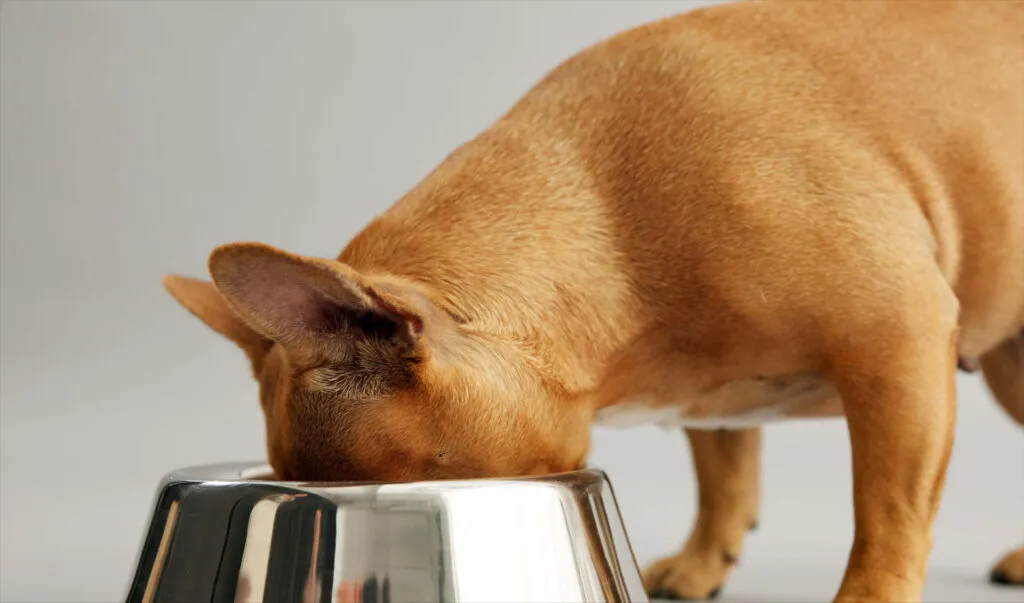 brown french bulldog with head in stainless steel bowl eating food
brown french bulldog with head in stainless steel bowl eating food
Here’s a quick recap of the main dietary needs to consider when choosing the best dog food to feed French Bulldogs:
- Proteins: Essential for maintaining and building muscle mass, proteins should primarily come from high-quality animal sources such as lean meat or fish. For healthy dogs, protein should ideally be the first ingredient listed on the food label, indicating its prominence in the formula. Aim for at least 25% crude protein content in dry kibble for adults.
- Fats: Constituting approximately 10-15% of their diet, fats serve as a concentrated energy source. They are also vital for numerous bodily processes, including hormone production, nutrient absorption (especially fat-soluble vitamins A, D, E, K), and insulating organs. Healthy fats like omega-3 and omega-6 fatty acids are crucial for skin and coat health.
- Carbohydrates: While not essential for every dog in the same way proteins and fats are, carbohydrates provide quick energy and are abundantly found in ingredients like grains, sweet potatoes, and legumes. They are particularly important for active dogs, pregnant or lactating females, and puppies. For French Bulldogs, complex carbohydrates that release energy slowly are often preferred to avoid blood sugar spikes and aid digestion.
Ingredients to Look for and Those to Avoid in Frenchie Dog Food
The quest for the best dog food to feed French Bulldogs often leads to scrutinizing ingredient lists. For Frenchies without known specific issues, certain ingredients are generally beneficial, while others should be approached with caution or avoided entirely due to potential sensitivities.
Beneficial Ingredients to Look For:
- High-Quality Protein Sources: Oily fish (like salmon), turkey, or lamb are excellent choices for maintaining lean muscle mass and are often less allergenic than more common proteins like chicken or beef.
- Omega Fatty Acids: Sources like salmon oil or flaxseed oil provide crucial omega-3s, which are vital for a strong skin barrier, reducing inflammation, and promoting a sleek, healthy coat. This is particularly important for French Bulldogs prone to skin issues.
- Complex Carbohydrates: Sweet potatoes are a fantastic source of carbohydrates, offering sustained energy release throughout the day and being easily digestible. Other good options include brown rice, oats, and peas.
- Prebiotics and Probiotics: These ingredients (e.g., FOS, MOS, chicory root, dried fermentation products) support a healthy gut microbiome, which is essential for robust digestive health and nutrient absorption, helping to alleviate common Frenchie tummy troubles.
- Fruits and Vegetables: Ingredients like blueberries, carrots, cranberries, and spinach are packed with antioxidants, vitamins, and minerals that boost the immune system and overall health.
Ingredients to Avoid or Limit:
- Common Allergens: For French Bulldogs, who are notoriously prone to food allergies, it’s often wise to avoid the most common triggers, which include chicken, beef, dairy, soy, egg, and certain grains (like wheat and corn).
- Vague Ingredient Terms: Be wary of labels that use ambiguous terms such as “meat by-products,” “animal digest,” or “vegetable protein.” These often indicate inconsistent ingredient sourcing and lower quality, which can be problematic for sensitive Frenchies.
- Artificial Additives: Steer clear of any added artificial flavors, colors, or chemical preservatives (e.g., BHA, BHT, ethoxyquin). These offer no nutritional benefit and can be detrimental to your dog’s health.
- Fillers: Ingredients like corn, wheat, and soy are often used as cheap fillers. While not always harmful, they can be difficult for some French Bulldogs to digest and may contribute to allergic reactions or digestive upset.
Top 10 Potentially Harmful Ingredients to Watch Out For:
| 1. BHA (Butylated Hydroxyanisole) | 6. Rendered Fat |
|---|---|
| 2. White Flour | 7. Vegetable Oil |
| 3. Meat Meal (unspecified) | 8. Farmed Salmon (potential contaminants) |
| 4. Artificial Food Coloring | 9. Nitrates/Nitrites |
| 5. Corn Syrup | 10. Melamine |
Food Requirements Throughout a Dog’s Life Stages
Just like humans, French Bulldogs’ nutritional needs change significantly as they age. The American Kennel Club (AKC) emphasizes the importance of a highly balanced diet tailored to maintain an ideal weight for their age. Obesity is a common issue for Frenchies, making it crucial to adjust their nutrient intake throughout their life stages.
Best Dog Food for Frenchie Puppies
French Bulldog puppies have unique requirements to support their rapid growth and development. The best dog food for French Bulldog puppies should be:
- Easy to Eat: Given their small mouths and developing jaws, small kibble size or a soft, moist food is ideal. Soaking kibble in warm water can also make it easier for them to consume.
- Calorie-Dense: Puppies need more calories per pound of body weight than adult dogs to fuel their growth and high energy levels.
- Rich in Calcium and Phosphorus: These minerals are vital for healthy skeletal development. A proper calcium-to-phosphorus ratio is essential to prevent bone growth abnormalities.
Suggested Portions: A Frenchie puppy between eight and 12 weeks of age typically requires about 1.5 cups of high-quality commercial puppy food daily, divided into three meals (approximately ½ cup per meal). As they grow, around six months of age, you can reduce feeding to twice daily. Always follow specific guidelines on the food packaging and consult your vet for personalized advice.
Food Requirements for an Adult Frenchie
Once your French Bulldog reaches adulthood, typically between 1 and 10 years of age, their dietary needs shift. Adult French Bulldogs require proportionately smaller amounts of proteins and fats compared to puppies. It’s crucial to transition them off puppy food, as its higher calorie content can quickly lead to obesity in adult Frenchies. Considering their predisposition to joint disorders like IVDD (Intervertebral Disc Disease) and hip dysplasia, maintaining a healthy weight is paramount for joint health.
Suggested Portions: Adult French Bulldogs generally thrive on one to two small meals daily, totaling 1 to 2.5 cups of commercial dog food, depending on their individual activity level, metabolism, and body condition. Less active or overweight Frenchies may require less food, while highly active dogs might need slightly more. Regular weight checks and veterinary consultations are essential for fine-tuning their diet.
Best Dog Food for a Frenchie Senior
As your Frenchie crosses into their senior years (typically over the age of 10), their metabolism slows, and their activity often decreases. The best dog food for a Frenchie senior should reflect these changes:
- Reduced Calories: Senior dog food formulas typically contain fewer calories than adult foods to prevent weight gain, which is crucial for older dogs with reduced activity levels and potential joint issues.
- Highly Digestible: Older dogs may have less efficient digestive systems, so easily digestible ingredients are beneficial.
- Joint Support: Diets supplemented with ingredients like Glucosamine and Chondroitin Sulphate are highly recommended to support aging joints and mitigate the effects of conditions like arthritis.
- Renal and Cardiac Support: Some senior formulas may also include ingredients that support kidney and heart health, depending on the dog’s individual needs.
Suggested Portions: Ideally, a senior Frenchie should be fed 1 to 1.5 cups of food daily, split into morning and evening meals. Consistent monitoring of their weight and health, along with regular vet check-ups, will help ensure their diet remains appropriate.
Homemade Food vs. Commercial Dog Food Brands: Pros and Cons
The debate between homemade and commercial dog food is ongoing among French Bulldog owners. While homemade diets offer certain advantages, they also present significant challenges.
Homemade Food:
- Pros:
- Ingredient Control: Owners know exactly what goes into their dog’s bowl, allowing them to avoid known allergens and undesirable additives.
- Palatability: Can be highly appealing to very fussy eaters.
- Freshness: Ingredients are typically fresh and less processed.
- Cons:
- Nutritional Imbalance: This is the most significant concern. As many vets will attest, it’s incredibly easy to create a diet that is nutritionally lacking or imbalanced in the 37 essential nutrients dogs require daily. A study by UC Davis found that 95% of 200 homemade dog food recipes analyzed were deficient in at least one essential nutrient, and 84% lacked multiple required nutrients.
- Time-Consuming: Preparing nutritionally complete homemade meals requires significant time and effort, which can be impractical for busy pet parents.
- Expense: Sourcing human-grade ingredients can be more costly than commercial alternatives.
- Risk of Contamination: Improper handling or cooking of raw ingredients can lead to bacterial contamination.
Commercial Dog Food:
- Pros:
- Nutritionally Complete & Balanced: Reputable commercial brands formulate their foods to meet specific nutritional standards (e.g., AAFCO statements), ensuring all necessary micronutrients are present.
- Convenience: Easy to store and serve, saving owners time and effort.
- Cost-Effective: Generally more affordable than homemade diets.
- Variety: Thousands of options available for different life stages, breed sizes, and health concerns.
- Cons:
- Processing: Can be more processed than homemade or fresh food options, potentially affecting digestibility for some dogs.
- Ingredients: May contain ingredients some owners prefer to avoid, such as certain preservatives, fillers, or unnamed “by-products.”
- Transparency: While labels provide information, the quality of some ingredients can be questionable, and misleading marketing can make selection difficult.
Unless you’re working closely with a board-certified veterinary nutritionist to develop a precise meal plan tailored to your French Bulldog’s life stage and health needs, the risks of nutritional deficiencies with homemade diets are high. For most owners, commercial diets, when chosen carefully, offer a safer and more convenient option.
Why is it so hard choosing the best food?
The pet food industry is a multi-billion-dollar market, often driven by profit. This can lead to companies cutting costs by using lower-quality ingredients or vague labeling practices. Unscrupulous marketing techniques on packaging can make it difficult to discern truly beneficial products from those that merely sound appealing. Furthermore, many companies frequently rotate their protein sources or use “meat by-products,” which can be disastrous for French Bulldogs with specific allergies. The best dog food to feed French Bulldogs with allergies should always contain a limited number of clearly listed ingredients.
So, what should the considered pet owner do? The first step should always be a conversation with your veterinarian. They can help you select a food that meets your Frenchie’s specific needs, considering their age, activity level, and overall health. Always scrutinize the pet food label, paying close attention to the ingredient list and the nutritional adequacy statement, often referred to as the AAFCO statement. This statement confirms whether the food is formulated to meet the nutritional levels established by the Association of American Feed Control Officials (AAFCO) for a specific life stage.
7 Tips to Find the Best Food for Your French Bulldog
When sourcing the ideal food for your furry friend, these factors are essential to consider:
- The Ingredients of the Dog Food: Prioritize diets with a limited number of whole, recognizable food ingredients. The ideal ingredients will depend on your dog’s taste preferences, any known medical issues, or allergies.
- Dog Foods Without Common Allergens: Given the high prevalence of food allergies in French Bulldogs, consider opting for diets that exclude the most common triggers, such as chicken, beef, dairy, soy, wheat, and corn, in both their daily food and treats.
- The Price of the Dog Food: While quality often comes at a price, choose a diet that is high-quality yet affordable for the long term. Consistency is key; frequently switching diets based on sales can disrupt your Frenchie’s digestive system.
- The Size and Shape of the Kibble: French Bulldogs are a brachycephalic breed with a unique jaw structure, making kibble size and shape crucial. Kibble should not be too large, ensuring it can be easily picked up and chewed, which also aids in preventing plaque and calculus buildup.
- The Flavor of the Dog Food: Even the most food-motivated Frenchie will have preferences. If your dog adores a particular protein like lamb or salmon, stick to a recipe that features it prominently to ensure mealtime is an enjoyable and consistent experience.
- The Consistency of Your Frenchie’s Stool: Stool quality is a direct indicator of digestive health. Many Frenchies benefit from a higher fiber diet to promote regularity, prevent loose stools, and reduce the risk of anal gland issues. Monitor their stool and consult your vet if you notice consistent changes.
- Signs of a Food Allergy in Your Frenchie: Be vigilant for symptoms like chronic itchiness, a yeasty odor to their skin, persistent vomiting, diarrhea, bloating, excessive flatulence, recurrent ear infections, or anal gland disease. These can all be indicators of food allergies. Discuss these signs with your vet, who may recommend an elimination diet or a hydrolyzed protein diet. You can learn more about the signs and management of French Bulldog allergies here.
The Best Food for French Bulldogs Depends on Your Dog
It’s a common misconception that all French Bulldogs can thrive on the same diet. The reality is that each dog is an individual. Some Frenchies are highly resilient and can enjoy a varied diet without issues, while others are incredibly sensitive and will suffer from gas, diarrhea, upset stomachs, or skin problems if fed the wrong diet. Let’s delve into these specific issues and the types of food that are generally recommended.
The Best Food for French Bulldog with a Sensitive Stomach
Dealing with a French Bulldog with a sensitive stomach can be frustrating. The key is to identify the underlying cause of their discomfort. While blood or saliva tests for food allergies are available, many veterinarians advise against them due to their often inaccurate results. The most reliable method for diagnosing a food allergy is through an elimination diet.
An elimination diet involves feeding your dog only a veterinary-prescribed, novel protein, or hydrolyzed protein diet for a specific period (typically 8-12 weeks). During this time, absolutely no other foods, treats, or flavored medications should be given.
 French bulldog wearing a purple bandana looking up
French bulldog wearing a purple bandana looking up
This structured approach is the most effective way to pinpoint specific allergens, far more reliable than trial-and-error with various commercial brands. Frenchies can be allergic to a wide range of common ingredients, including chicken, beef, lamb, salmon, duck, pork, and dairy. Even expensive, high-quality food will cause issues if it contains an ingredient your dog is allergic to.
If you are considering an elimination diet, this guide from Tufts Petfoodology offers valuable insights. Once you’ve successfully identified the allergens, you can then select a new food entirely free of those triggers.
Ranked: Best Food for French Bulldogs with Sensitive Stomach
| Rank | Brand & Food | Why | |
|---|---|---|---|
| 1 | 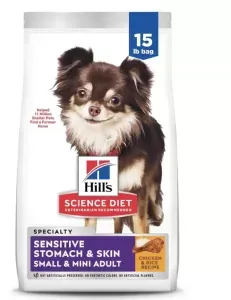 Hill’s Science Diet Hill’s Science Diet | Hill’s Science Diet Sensitive Stomach & Skin | Vet top choice, highly digestible with prebiotics, supports a healthy microbiome |
| 2 | Purina Pro Plan Sensitive Skin & Stomach (Salmon & Rice) | Balanced, affordable, vet-trusted, uses salmon as a novel protein for many | |
| 3 | 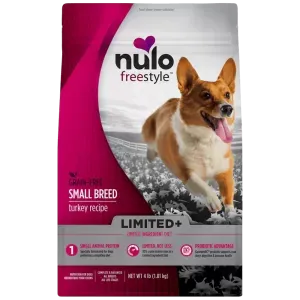 | Nulo Freestyle Limited+ Turkey or Salmon Recipe | High-quality, boutique premium pick, clean limited ingredient formula with a single animal protein |
| 4 | 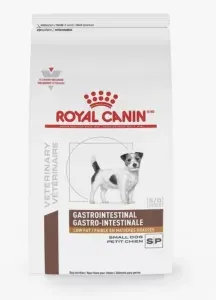 Royal Canin Royal Canin | Royal Canin Veterinary Diet Gastrointestinal Low Fat | Vet-only prescription for severe cases of gastrointestinal issues, highly digestible |
| 5 | 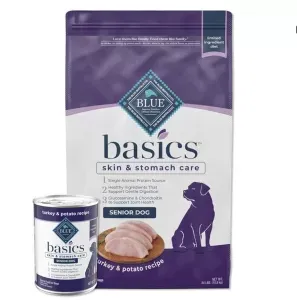 Blue Buffalo Basics Blue Buffalo Basics | Blue Buffalo Basics Limited Ingredient Diet (Turkey & Potato) | Good hypoallergenic non-prescription option, limited ingredients for fewer potential irritants |
The Best Dog Food for Frenchies with Allergies
As previously discussed, a thorough elimination diet is the most effective way to determine what your French Bulldog is allergic to. French Bulldogs can exhibit allergic reactions through various symptoms, including chronic skin issues like itching, vomiting, or diarrhea, all stemming from their diet. Identifying the specific allergen is crucial for making informed choices about their food and improving their quality of life. Once the allergens are identified through the elimination trial, you can select a diet that specifically avoids these triggers.
Below is a table summarizing the most common food allergens for French Bulldogs and their potential symptoms:
| Allergen | Frequency | Potential Symptoms |
|---|---|---|
| Beef | Very Common | Skin irritation, intense itching, chronic ear infections, digestive upset (diarrhea, vomiting) |
| Dairy | Common | Diarrhea, gas, vomiting, itchy skin |
| Chicken | Common | Skin problems, ear infections, gastrointestinal upset |
| Wheat | Common | Itchy skin, gastrointestinal upset, poor coat quality |
| Soy | Common | Skin issues, ear infections, gastrointestinal problems |
| Egg | Moderate | Skin irritation, vomiting, diarrhea |
| Lamb | Moderate | Skin issues, digestive problems |
| Pork | Moderate | Skin irritation, gastrointestinal upset |
| Fish | Less Common | Skin problems, vomiting (often a novel protein for allergy diets) |
| Corn | Less Common | Skin irritation, digestive issues |
Our Recommended Best Dog Food for Frenchies with Allergies
| Brand & Product | Key Features | Why It’s Great for Allergies | Format | Price Range | |
|---|---|---|---|---|---|
| Hill’s Prescription Diet z/d | Hydrolyzed protein, single carb source | Formulated to reduce skin & food sensitivities by breaking down proteins to prevent immune response | Dry | $$$ | 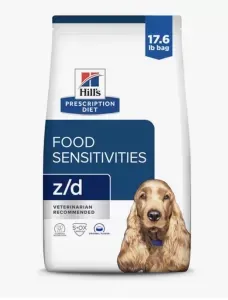 hills prescription z/d food package best food for french bulldogs with allergies Try Hills hills prescription z/d food package best food for french bulldogs with allergies Try Hills |
| Royal Canin Selected Protein (e.g., PD Rabbit or Venison) | Novel protein (rabbit, venison, duck) | Ideal for elimination diets, using protein sources your dog is unlikely to have encountered before | Dry/Wet | $$$ | 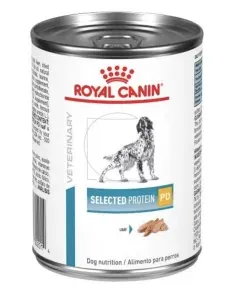 royal canin selected protein good food for french bulldog with allergies Try Royal Canin royal canin selected protein good food for french bulldog with allergies Try Royal Canin |
| Natural Balance L.I.D. Sweet Potato & Fish | Single protein, limited ingredients | Great for food intolerance, utilizing simple ingredient lists to minimize exposure to allergens | Dry | $$ |  Natural Balance bag of food – rated number 3 best food for french bulldogs with allergies Try Natural Balance Natural Balance bag of food – rated number 3 best food for french bulldogs with allergies Try Natural Balance |
| Zignature Turkey L.I.D. | No chicken, beef, or dairy; single protein | Anti-inflammatory protein source, formulated to avoid common allergens, excellent for sensitive dogs | Dry | $$ | 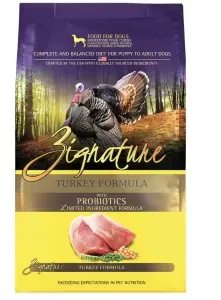 zignature dog food bag good food for french bulldogs with allergiesTry Zignature zignature dog food bag good food for french bulldogs with allergiesTry Zignature |
| Ollie Fresh Dog Food | Custom meal plans, no fillers or common allergens | Perfect for food allergies and sensitive skin, ingredients are human-grade and customizable for specific sensitivities | Fresh | $$$ |  Ollie Dog Foood starer kit Try Ollie Ollie Dog Foood starer kit Try Ollie |
The Best Food for Gassy French Bulldogs
Excessive gassiness is a common complaint among French Bulldog owners, often due to their brachycephalic anatomy (which can lead to them swallowing more air while eating) and sensitive digestive systems.
First, consider using a slow feeder bowl. These bowls are designed to make your Frenchie eat more slowly, which improves digestion by reducing the amount of air they ingest, a major contributor to flatulence. Slow feeders also assist with portion control, as overeating can lead to excessive gas.
When searching for food to reduce gassiness, prioritize formulas with limited, easily digestible ingredients. Avoid common allergens for French Bulldogs, as listed in the table above, as these can often trigger digestive upset and gas.
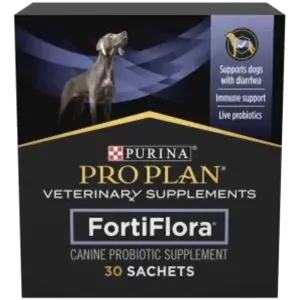 FortiFlora ProbioticIf your Frenchie is excessively gassy, a probiotic supplement like FortiFlora can be very beneficial. Probiotics introduce beneficial bacteria to the gut, helping to balance the digestive microbiome and reduce fermentation that leads to gas.
FortiFlora ProbioticIf your Frenchie is excessively gassy, a probiotic supplement like FortiFlora can be very beneficial. Probiotics introduce beneficial bacteria to the gut, helping to balance the digestive microbiome and reduce fermentation that leads to gas.
The Best Wet Food for Frenchies
Some French Bulldog owners exclusively feed their dogs wet food, either due to preference, dental issues, or simply because their Frenchie refuses to eat anything else. High-quality wet food can be an excellent option for hydration and palatability. Here are some great brands that offer high-quality wet food, which can be a vital component of the best dog food to feed French Bulldogs who prefer moist meals:
Stella & Chewy’s offers a variety of wet food options and a helpful quiz to guide you to products suited for your Frenchie’s specific needs, including allergies.
 Cage-Free Turkey StewCage-Free Turkey Stew – This human-grade stew is a fantastic limited-ingredient option, perfect for Frenchies with food sensitivities. It uses cage-free turkey as a primary protein source.
Cage-Free Turkey StewCage-Free Turkey Stew – This human-grade stew is a fantastic limited-ingredient option, perfect for Frenchies with food sensitivities. It uses cage-free turkey as a primary protein source.
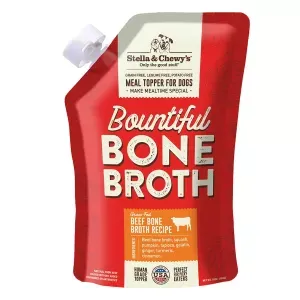 Bountiful Bone Broth Grass-Fed Beef RecipeBountiful Bone Broth Grass-Fed Beef Recipe – Rich in protein and made without by-products, artificial colors, flavors, or preservatives, and completely grain-free. Its high moisture content also aids in digestion and hydration.
Bountiful Bone Broth Grass-Fed Beef RecipeBountiful Bone Broth Grass-Fed Beef Recipe – Rich in protein and made without by-products, artificial colors, flavors, or preservatives, and completely grain-free. Its high moisture content also aids in digestion and hydration.
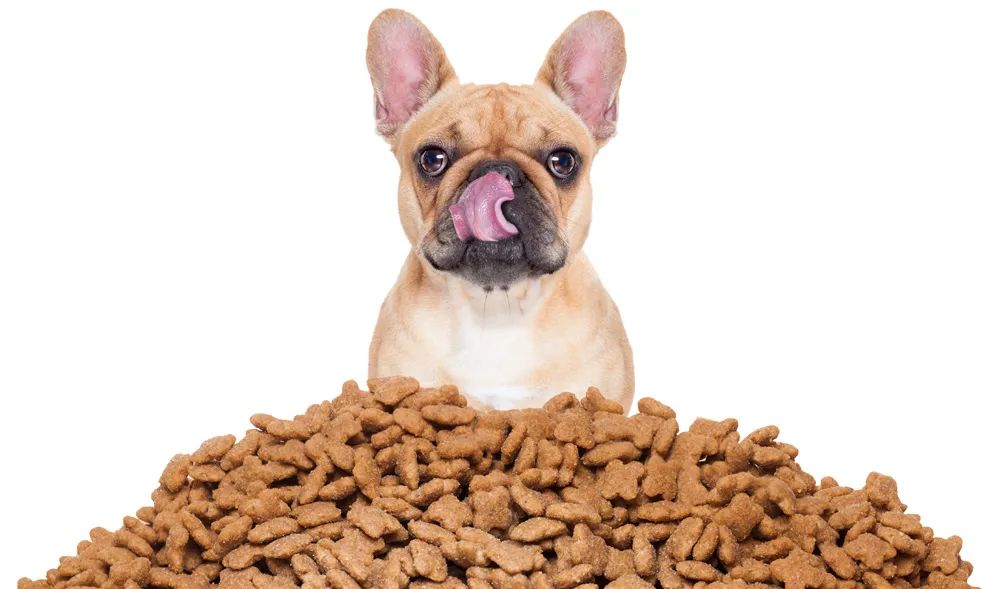 french bulldog sitting in front of large mound of dry dog food – best dry dog food for french bulldogs
french bulldog sitting in front of large mound of dry dog food – best dry dog food for french bulldogs
The Best Kibble for French Bulldogs
The choice of dry kibble for your French Bulldog depends significantly on their individual health profile. While there’s a considerable debate around grain-free diets, the consensus is that the quality of grains (or lack thereof) is more important. This means avoiding animal by-products, cheap fillers, gluten, corn, and wheat. Unfortunately, many non-prescription kibbles can contain unlisted fillers, posing a problem for Frenchies with specific allergies. For such cases, prescription dog food is often recommended.
Here are the top 3 best kibble for French Bulldogs, as highly rated by French Bulldog owners:
 bag of royal canin french bulldog food – one of the recommended best kibble for french bulldogs
bag of royal canin french bulldog food – one of the recommended best kibble for french bulldogs
Royal Canin French Bulldog Adult
A perennial favorite among Frenchie owners, this dry dog food is specifically engineered for the breed’s unique needs. Its kibble size and shape are perfectly adapted for the French Bulldog’s flat face and short muzzle, making it easier to pick up and chew. The formula’s carefully balanced protein content and high digestibility are designed to help reduce common gas issues in the breed.
 bag of hills science diet sensitive stomach and skin recommended as one of the best dry dog food for french bulldogs
bag of hills science diet sensitive stomach and skin recommended as one of the best dry dog food for french bulldogs
Hill’s Science Diet Sensitive Stomach & Skin
With its highly controlled ingredients and a strong emphasis on digestive health, the Hill’s Science Diet Sensitive Stomach & Skin formula is an excellent choice for allergy-prone Frenchies. Many owners report significant improvements in both their Frenchie’s coat quality and a reduction in stomach issues after transitioning to this food. It’s formulated to be gentle on sensitive digestive systems while providing complete nutrition.
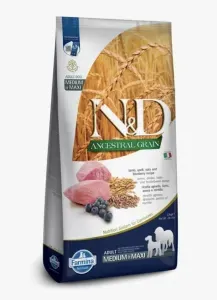 Farmina N&D Ancestral Grain recommended as one of the best kibble for french bulldogs
Farmina N&D Ancestral Grain recommended as one of the best kibble for french bulldogs
Farmina N&D Ancestral Grain Lamb & Blueberry Adult
Gaining popularity among owners seeking a higher-protein option with premium ingredients, Farmina N&D Ancestral Grain offers a moderate grain content. This carefully selected grain inclusion (e.g., oats, spelt) is often well-tolerated by dogs with sensitivities and provides sustained energy, making it a good choice for French Bulldogs without severe grain allergies.
Important Considerations from Owner Experiences
When selecting the best dog food to feed French Bulldogs, considering insights from experienced owners can be invaluable. Here are key takeaways that often lead to successful dietary choices:
- Kibble Size and Shape: The unique brachycephalic facial structure of French Bulldogs necessitates kibble that is specifically designed for their short muzzles and bite. Smaller, uniquely shaped kibble makes it easier for them to pick up and chew effectively, reducing the risk of choking and aiding digestion.
- Easily Digestible Protein Sources: To minimize gas and digestive upset, opt for high-quality protein sources that are known for their digestibility, such as lamb, turkey, or novel proteins like duck or salmon. These can be less taxing on a sensitive Frenchie stomach.
- Limited Ingredient Foods (LID): LIDs are often highly effective in preventing and managing allergies in French Bulldogs. By reducing the number of ingredients, it’s easier to identify and avoid potential allergens.
- Moderate Fat Content: Maintaining a moderate fat content in their diet is crucial not only for weight management (preventing obesity) but also for supporting digestive health. Excessive fat can sometimes lead to pancreatitis or gastrointestinal upset in sensitive dogs.
- Avoid Common Allergens: Continuously avoid ingredients known to commonly trigger allergies in French Bulldogs, such as chicken, beef, dairy, wheat, soy, and corn. Refer to our detailed allergen table for a comprehensive list.
When transitioning to a new food, always do so gradually over 7-10 days, slowly mixing increasing amounts of the new food with decreasing amounts of the old. During this period, diligently monitor your Frenchie for any signs of allergic reactions or sensitivities, such as itching, excessive paw licking, skin redness, or digestive issues (vomiting, diarrhea, gas). Early detection can prevent prolonged discomfort.
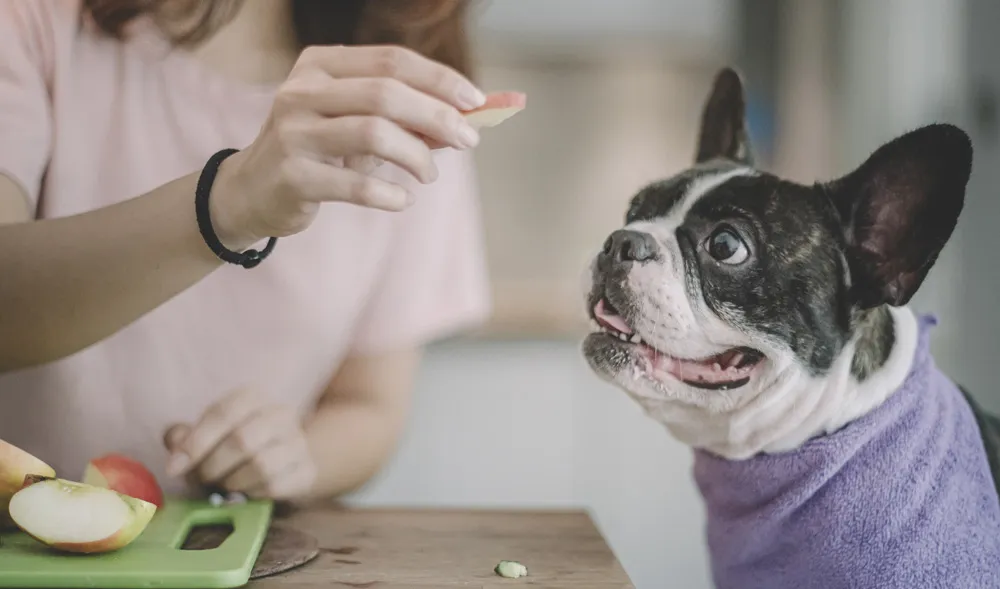 black and whitw french bulldog with purple bib on with owner hand feeding. it apple
black and whitw french bulldog with purple bib on with owner hand feeding. it apple
The Best Raw Food for Frenchies
A raw dog food diet, often referred to as a Biologically Appropriate Raw Food (BARF) diet, is an option many French Bulldog owners explore, especially for fussy eaters or those struggling with persistent allergies. Many owners switch to a raw diet due to skin issues, chronic diarrhea, vomiting, or excessive gas, and report significant improvements.
The primary reason raw food is often beneficial for allergies is its digestibility. Raw, unprocessed ingredients can be easier for a dog’s digestive system to break down, which can alleviate symptoms like vomiting, diarrhea, or gassiness. Furthermore, the essential fatty acids and high-quality, biologically available proteins found in raw foods can dramatically improve your Frenchie’s skin and coat health, often reducing inflammation and itchiness. Being typically lower in carbohydrates and higher in protein, raw food diets can also be advantageous for weight management, helping Frenchies maintain a lean body condition.
However, transitioning to a raw food diet should not be taken lightly. It comes with potential risks, most notably the risk of nutritional imbalance if not formulated correctly, and potential bacterial contamination. It is imperative to consult a veterinary nutritionist if you are considering this route for your French Bulldog. A professional can help you develop a balanced meal plan tailored to your dog’s specific needs, ensuring they receive all necessary nutrients.
We recommend:
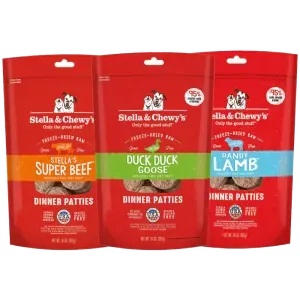 Stella & ChewyStella & Chewy’s offers a variety of freeze-dried raw food options. Freeze-drying significantly reduces bacteria, making it a more convenient and safer raw food choice compared to preparing raw meals from scratch at home. Their formulas are designed to be nutritionally complete and balanced.
Stella & ChewyStella & Chewy’s offers a variety of freeze-dried raw food options. Freeze-drying significantly reduces bacteria, making it a more convenient and safer raw food choice compared to preparing raw meals from scratch at home. Their formulas are designed to be nutritionally complete and balanced.
FOOD FAQ: Can French Bulldogs Eat This?
Many owners have questions about specific human foods and whether they are safe for their French Bulldogs to eat. Here’s a comprehensive guide to common foods owners ask about:
| Food | Can French Bulldogs Eat It? | Notes |
|---|---|---|
| Eggs | Yes | Cooked only (scrambled, hard-boiled), a good source of protein. Avoid raw egg whites. |
| Squid | Yes | In moderation, cooked (boiled, steamed), unseasoned, and cut into small pieces to prevent choking. |
| Carrots | Yes | Excellent for teeth cleaning, high in fiber and vitamins. Serve raw or cooked. |
| Bananas | Yes | In moderation due to high sugar content. A good source of potassium and vitamins. |
| Blueberries | Yes | Antioxidant-rich, good in small amounts as a healthy treat. |
| Blackberries | Yes | Similar to blueberries, feed in moderation due to sugar content. |
| Celery | Yes | Low calorie, good for teeth, and a source of vitamins A, C, and K. Cut into small pieces. |
| Pineapple | Yes | Small amounts only, remove tough core and rind. High in sugar and acidity. |
| Chicken | Yes | Cooked thoroughly, no bones, skin, or seasoning. A common protein, but watch for allergies. |
| Cantaloupe | Yes | In moderation, remove seeds and rind. High in vitamins A and C. |
| Mango | Yes | Remove the large pit (choking hazard and contains cyanide), feed in moderation due to sugar. |
| Watermelon | Yes | Remove seeds and rind. A hydrating, low-calorie treat in moderation. |
| Strawberries | Yes | Good source of vitamins, in moderation. Some dogs may not tolerate. |
| Cheese | With Caution | Small amounts only, some dogs are lactose intolerant. High in fat, so can cause stomach upset. |
| Avocado | No | Contains persin, which is toxic to dogs, especially in the pit and skin. |
| Rice | Yes | Plain, cooked white or brown rice is easily digestible and often recommended for upset stomachs. |
| Oranges | With Caution | Small amounts, high acidity may cause stomach upset. Remove seeds and peel. |
| Apples | Yes | Remove seeds (contain cyanide) and core. A good source of fiber and vitamins. |
| Peanut butter | Yes | Unsalted, unsweetened, and absolutely no xylitol. Feed in moderation due to high fat content. |
| Cucumbers | Yes | Low calorie, good for hydration. A crunchy, healthy treat. |
| Raspberries | Yes | In moderation. Contain trace amounts of xylitol, but generally safe in small quantities. |
| Grapes & Raisins | No | Highly toxic to dogs and can cause acute kidney failure. Avoid at all costs. |
Best Food for French Bulldogs FAQ
What is the best food for French Bulldogs with sensitive stomachs?
As a Frenchie owner myself, I know how tricky sensitive stomachs can be! Many French Bulldogs do best on limited-ingredient diets with easily digestible proteins like turkey, lamb, or salmon. If your Frenchie struggles with a sensitive stomach, look for foods free from common irritants like corn, wheat, and soy. Brands like Hill’s Science Diet Sensitive Stomach & Skin are often a great starting point — they focus on gentle, simple ingredients that Frenchie tummies love and include prebiotics to support gut health. Always consult your vet to rule out underlying medical conditions.
Should French Bulldogs eat grain-free dog food?
This is a question I hear from Frenchie parents all the time! Grain-free diets can help if your dog has a true grain allergy — but for most Frenchies, healthy, easily digestible grains like oats, brown rice, or barley are perfectly fine and even beneficial, providing fiber and nutrients. There have been some ongoing concerns about potential links between certain grain-free diets (especially those rich in legumes like peas and lentils as primary ingredients) and heart conditions (dilated cardiomyopathy) in some dogs. Always chat with your vet before making a switch to a grain-free diet to ensure it’s the right choice for your individual dog’s health needs.
How often should I feed my French Bulldog?
In my experience, most Frenchies thrive on two meals a day once they reach adulthood — one in the morning and one in the evening. This schedule helps maintain stable blood sugar levels and prevents overeating in a single sitting, which can reduce the risk of digestive issues and bloat. Puppies under six months usually need three meals a day to keep up with their higher energy demands and rapid growth spurts. Always refer to your chosen food’s feeding guidelines and adjust based on your Frenchie’s activity level and body condition, with your vet’s input.
How can I tell if my Frenchie is allergic to their food?
Some of the first signs I noticed when my own Frenchie had food sensitivities were persistent itching, flaky skin, ear infections, and occasional soft stools or gas. Common signs of a food allergy or intolerance in French Bulldogs include:
- Persistent scratching, licking paws, or rubbing their face
- Chronic ear infections or skin infections
- Upset stomach (vomiting or diarrhea)
- Red, inflamed skin, hot spots, or hair loss
- Excessive flatulence or bloating
If you notice any of these symptoms consistently, it’s definitely worth speaking with your vet about conducting an elimination diet to pinpoint the exact food trigger. I talk more about this here – French Bulldogs Allergies.
What ingredients should I avoid in French Bulldog food?
Over the years, I’ve learned to steer clear of dog foods packed with fillers or artificial additives, especially for sensitive Frenchies. When choosing food for your French Bulldog, specifically avoid:
- Artificial preservatives like BHA, BHT, and ethoxyquin
- Generic “meat by-products” or “animal digest” (indicating low-quality or inconsistent protein sources)
- Cheap fillers like corn, wheat, and soy, which are common allergens and difficult to digest for some Frenchies
- Artificial colors and flavors
Instead, prioritize real, whole meat proteins (like turkey, lamb, or salmon), natural ingredients, and minimal processing. Your Frenchie’s skin, stomach, and overall health will be so much better for it, contributing to their long-term well-being.
Resources:
- Critical Reviews in Food Science and Nutrition: Food Allergy in Dogs and Cats: A Review. 2007. Verlinden et al.
- American Kennel Club: Benefits of Fresh Dog Food vs. Raw Food vs. Kibble For Your Dog. 2021.
- PetMd: Dog Nutrition: Guide to Dog Food Nutrients. 2021.
- Veterinary Dermatology: A prospective study on canine atopic dermatitis and food-induced allergic dermatitis in Switzerland. 2008. Picco et al.
- Tufts University Cummings School of Veterinary Medicine, Clinical Nutrition Service: Think Your Pet Has a Food Allergy? Eliminating Mistakes in Elimination Diet Trials. 2022.
- AAFCO: Understanding Pet Food Labels. Ongoing.

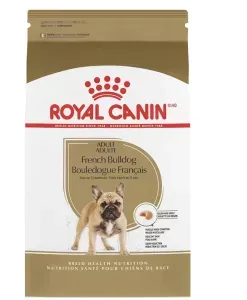 bag of royal canin french bulldog food – one of the recommended best kibble for french bulldogs
bag of royal canin french bulldog food – one of the recommended best kibble for french bulldogs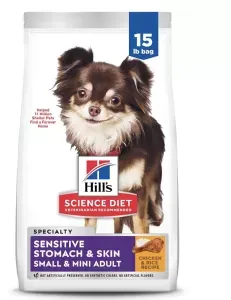 bag of hills science diet sensitive stomach and skin recommended as one of the best dry dog food for french bulldogs
bag of hills science diet sensitive stomach and skin recommended as one of the best dry dog food for french bulldogs